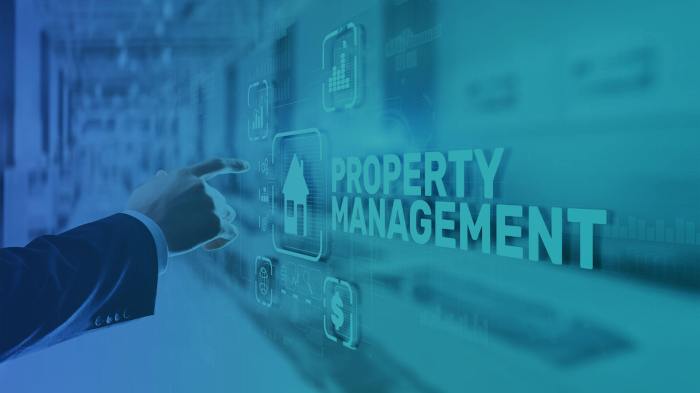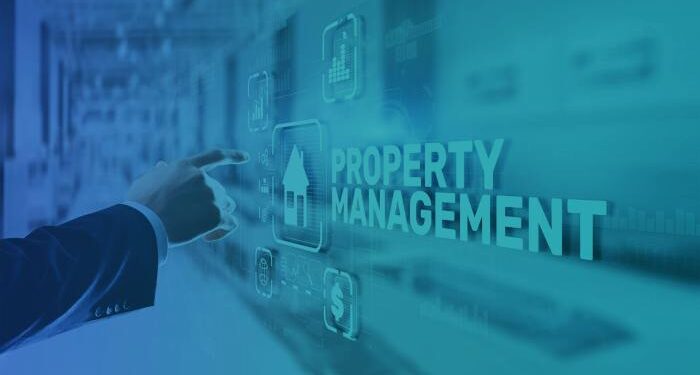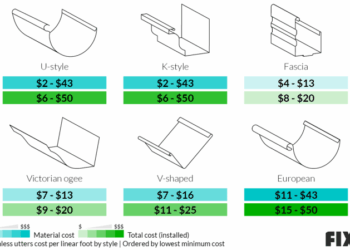Embark on a journey into the world of AI property management, where cutting-edge technology meets real estate operations. Discover how AI is reshaping the way properties are managed, optimized, and enhanced for both landlords and tenants alike.
Introduction to AI Property Management

AI property management refers to the use of artificial intelligence technologies to streamline and optimize the management of real estate properties. This innovative approach leverages AI algorithms and data analysis to enhance operational efficiency, improve tenant experiences, and maximize property value.
AI is revolutionizing property management practices by automating routine tasks, predicting maintenance needs, and providing valuable insights for decision-making. From predictive maintenance to smart security systems, AI is transforming the way properties are managed and maintained in the real estate industry.
Examples of AI Applications in Property Management
- Automated Maintenance Scheduling: AI-powered systems can analyze historical data and identify patterns to predict when maintenance tasks should be performed, reducing the risk of unexpected breakdowns.
- Smart Energy Management: AI algorithms can optimize energy usage in buildings by adjusting heating, cooling, and lighting systems based on occupancy patterns and external factors, leading to cost savings.
- Virtual Assistants for Tenants: Chatbots and virtual assistants powered by AI can provide instant responses to tenant inquiries, schedule maintenance requests, and offer personalized recommendations for amenities and services.
- Risk Assessment and Security: AI algorithms can analyze security camera footage in real-time to detect anomalies, identify potential threats, and alert property managers or security personnel, enhancing overall safety and security measures.
Benefits of AI in Property Management
AI technology offers numerous benefits when applied to property management operations. By leveraging AI tools and algorithms, property managers can streamline processes, improve efficiency, and enhance overall tenant experience.
Optimizing Property Maintenance Tasks
- AI-powered predictive maintenance can anticipate equipment failures before they occur, reducing downtime and costly repairs.
- Automated scheduling and routing of maintenance tasks based on priority and urgency can help property managers allocate resources effectively.
- AI algorithms can analyze historical data to identify patterns and trends, allowing for proactive maintenance planning and budgeting.
Enhancing Tenant Experience and Satisfaction
- AI chatbots can provide instant responses to tenant inquiries, improving communication and customer service.
- Personalized recommendations based on tenant preferences can enhance the overall living experience and satisfaction.
- AI analytics can track tenant feedback and sentiment to identify areas for improvement and address issues promptly.
AI Tools for Property Management
AI technology has revolutionized the way property managers handle their tasks, offering efficient solutions to streamline operations and enhance tenant experiences. Let's explore some popular AI tools and technologies used in property management:
Virtual Assistants
- One of the most common AI tools used in property management is virtual assistants, such as chatbots or voice-activated systems. These tools can help property managers respond to tenant inquiries, schedule maintenance requests, and provide information about the property.
- Virtual assistants like Siri, Alexa, or Google Assistant can also be integrated into smart home devices to control various aspects of the property remotely.
Predictive Maintenance Software
- AI-powered predictive maintenance software analyzes data from IoT sensors to predict when maintenance is needed on equipment or systems within a property. This proactive approach helps prevent costly breakdowns and ensures that everything is running smoothly.
- Examples of predictive maintenance software include IBM Maximo and Upkeep, which offer predictive analytics and maintenance scheduling features for property managers.
Smart Access Control Systems
- AI-driven smart access control systems use facial recognition, fingerprint scanning, or keyless entry to enhance security and streamline access for tenants and property managers.
- These systems can track who enters and exits the property, send alerts for unauthorized access, and provide convenient access management solutions.
Implementation of AI in Property Management
Integrating AI into existing property management systems can greatly enhance efficiency and accuracy in various tasks
Challenges and Considerations
- Data Quality: Ensuring the accuracy and reliability of data used to train AI models is crucial for successful implementation.
- Cost: Investing in AI technology can be expensive, so it's important to consider the long-term benefits and ROI.
- Resistance to Change: Some stakeholders may be hesitant to adopt AI, so effective communication and training are essential.
- Regulatory Compliance: Property management involves sensitive data, so ensuring compliance with regulations like GDPR is crucial.
Best Practices for Successful AI Adoption
- Start Small: Begin with pilot projects to test AI solutions before scaling up.
- Collaboration: Involve property managers, IT professionals, and other stakeholders in the implementation process.
- Continuous Monitoring: Regularly evaluate AI performance and make necessary adjustments to optimize results.
- Training and Support: Provide training to staff to ensure they understand how to effectively use AI tools in their daily tasks.
Future Trends of AI in Property Management
Artificial Intelligence (AI) continues to revolutionize the property management industry, paving the way for exciting future trends and innovations. Let's explore the upcoming trends and potential impact of AI on the future of real estate management.
Enhanced Predictive Analytics
Predictive analytics powered by AI is set to become even more sophisticated in property management. AI algorithms can analyze vast amounts of data to forecast trends, anticipate maintenance needs, and optimize rental pricing strategies. This predictive capability will enable property managers to make data-driven decisions and enhance operational efficiency.
Personalized Tenant Experiences
AI tools are being increasingly utilized to provide personalized experiences for tenants. Chatbots powered by AI can address tenant queries, schedule maintenance requests, and even offer virtual property tours. By leveraging AI to deliver tailored services and streamline communication, property managers can enhance tenant satisfaction and retention rates.
Automation of Routine Tasks
Automation is a key trend in property management, and AI is at the forefront of streamlining routine tasks. From processing rental applications to scheduling property inspections, AI-powered systems can automate time-consuming processes, freeing up property managers to focus on strategic decision-making and tenant relationships.
Smart Building Management
The integration of AI in smart building management is set to transform how properties are maintained and operated. AI-powered systems can monitor energy consumption, optimize HVAC systems, and detect maintenance issues in real-time. By implementing AI in building management, property owners can reduce operational costs, improve sustainability, and create more efficient living spaces.
Enhanced Security Measures
AI-driven security solutions are a growing trend in property management, offering advanced surveillance, access control, and threat detection capabilities. Machine learning algorithms can analyze security footage, identify anomalies, and alert property managers to potential risks. With AI-enhanced security measures, property owners can enhance the safety and security of their properties.
Conclusive Thoughts
In conclusion, AI property management is not just a trend but a transformative force in the real estate industry. As we look towards the future, the integration of AI promises to revolutionize property management practices, setting new standards of efficiency and innovation.
FAQs
How can AI benefit property management operations?
AI can streamline tasks, automate processes, and provide valuable insights for better decision-making in property management.
What are some popular AI tools used in property management?
Popular AI tools include virtual assistants, predictive maintenance software, and data analytics platforms tailored for property management.
What challenges are faced when implementing AI in property management?
Challenges may include initial costs, data privacy concerns, and resistance to change among property management teams.











